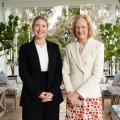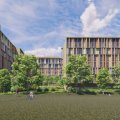A leading medical researcher who has discovered a breakthrough ulcer treatment made entirely from Queensland bananas has been appointed an Adjunct Professor with the University of Queensland.
Professor Brian Hills, Director of the Paediatric Respiratory Research Centre at the Mater Children's Hospital, was appointed an Adjunct Professor with the University's Medicine Department from January this year.
He takes up one of more than 20 new adjunct professorial appointments with University faculties and administration approved recently by the University Senate.
Professor Hills' unusual background in physical chemistry, engineering and physiology led him to discover the healing and prophylactic properties of surfactants - substances which can also act as natural lubricants and corrosion inhibitors in plants and animals.
He said his main role within the Department would be to deliver a lecture series on respiratory physiology at the Mater Hospital and continue his research into surfactants.
'It's very important that some lectures to the registrars and fellows are given by people at the cutting edge of research,' Professor Hills said.
Professor Hills found surfactants formed protective linings in human organs such as the stomach and lungs with direct application to peptic ulcer and lesser gastric disorders.
Manufactured from the skin and fruit of bananas, the powdered treatment can be mixed with milk or water and then swallowed to relieve ulcer pain. Funded by a $1 million grant from the Horticultural Research and Development Corporation and Queensland Banana Growers, a commercial sponsor is now being sought from the pharmaceutical industry to bring the product to the market.
'I discovered that the surfactant lining stop the stomach from digesting itself, acting in much the same way as engineers use corrosion inhibitors to stop steel rusting,' Professor Hills said.
'The treatment replaces the thin coating eroded by ulcers. It's like the old saying about drinking a glass of milk to give you an ?inside lining'.'
Professor Hills' current research also involves the development of surfactant as a lubricant for injecting into arthritic joints to alleviate pain, stiffness and general disability. Clinical trials run by Dr Phillip Vecchio and Dr Ranjeny Thomas of the University's Department of Medicine at Princess Alexandra Hospital have yielded encouraging results.
However, the major theme of his research is prolonged respiratory apnoea with particular clinical reference to cot death or Sudden Infant Death Syndrome (SIDS) and sleep apnoea.
Working in collaboration with Dr Brent Masters of the Mater Children's Hospital before joining that institution, Professor Hills discovered very unusual properties of surfactant in the lungs of infants with these disorders.
The researchers are now exploiting the discovery to try to detect newborns at risk of SIDS. Other applications of this basic-science approach to surfactant are being undertaken into dialysis in collaboration with Dr John Burke at the Princess Alexandria Hospital and into surgical adhesions with Associate Professor Les Nathanson of the University's Department of Surgery at Royal Brisbane Hospital.
According to Vice-Chancellor Professor John Hay, the adjunct professorial system facilitates a more active interchange of ideas and encourages co-operation between the University and the professions, industry and the wider community.
Professor Hay said adjunct professors were people recognised by their peers in the profession, business community or public sector as persons of distinction and high achievement.
'These community decision makers and opinion leaders will be encouraged to work closely with the University for mutual benefit - not to lecture or teach, but to talk about ways and means of doing things,' Professor Hay said.
'We want the University to work more closely with the community to help create the new intellectual products this State and country will need.'
Formerly professor of physiology and anaesthesiology in the University of Texas Medical School, Houston and Galveston (1975-86), Professor Hills is the author of four books, 160 refereed papers, 17 book chapters and 13 patents.
He has accrued many honours and distinctions in his 42-year career. In 1977, he was elected chair of an international committee to make recommendations to the Energy Research and Development Authority in Washington on the funding of research into the health of deep sea divers.
Between 1978 and 1985, he was consultant in biomedical physiology to NASA and the only external member of a Decompression Committee set up to advise on the environment for the first shuttle and space station.
In 1988, he received a Royal Australian Navy teaching award for lectures contributed to their Underwater Medicine courses.
A leading researcher in the fields of decompression sickness, Professor Hills has conducted five contracts on the subject totalling $310,000 for the Office of Naval Research in Washington DC.
For more information, contact Professor Hills (telephone 3390 1049 or 3840 8058).




